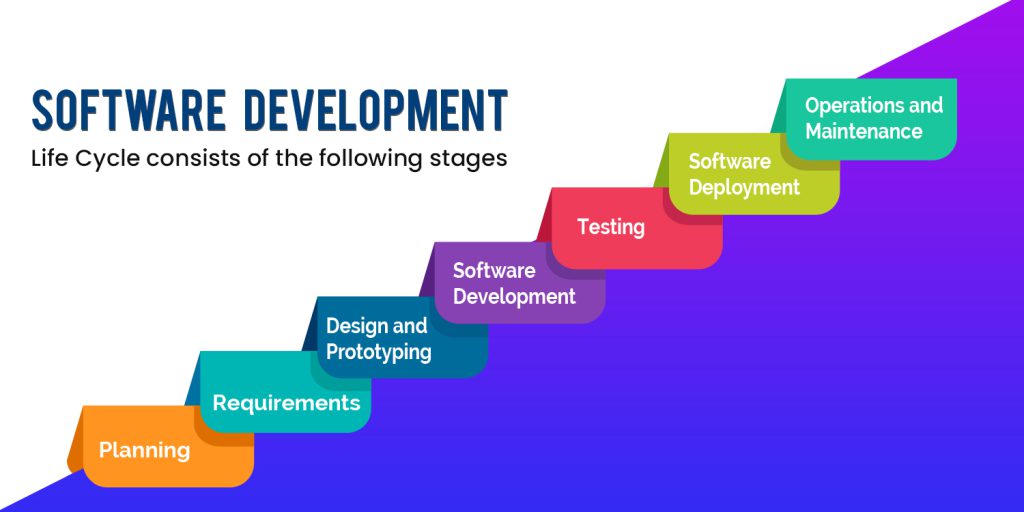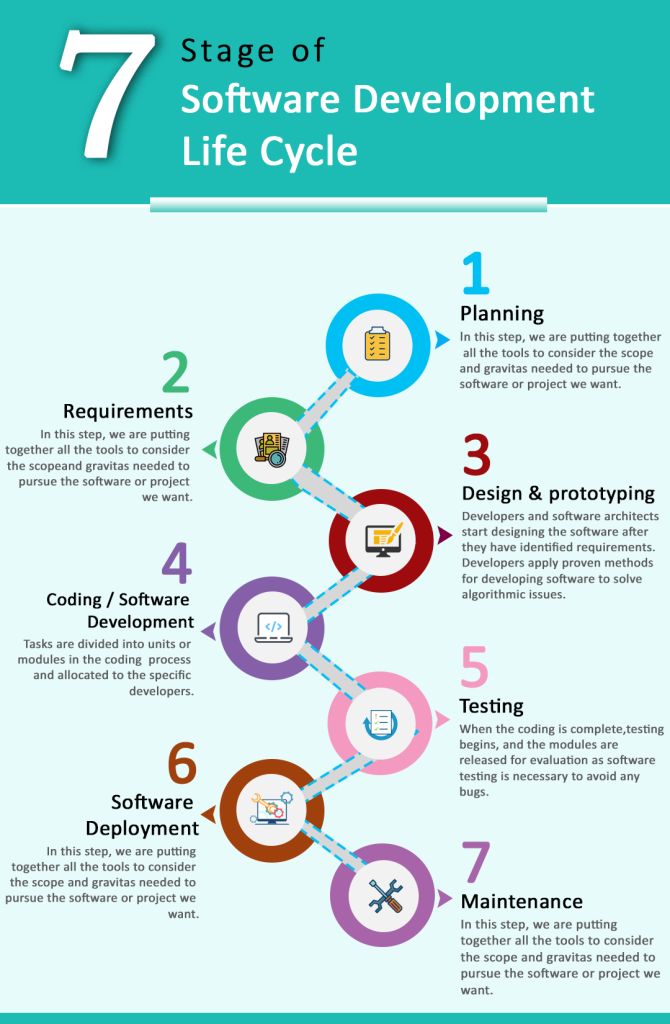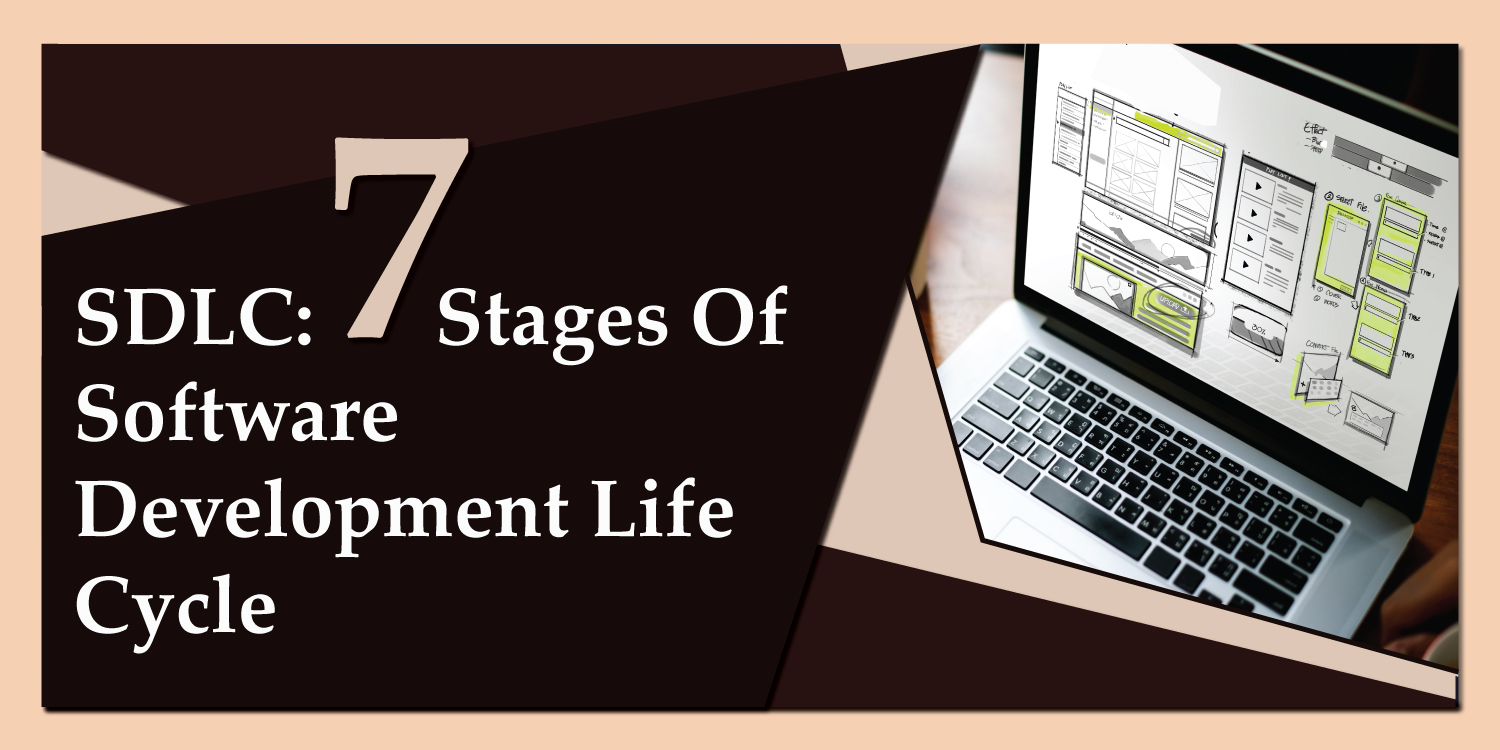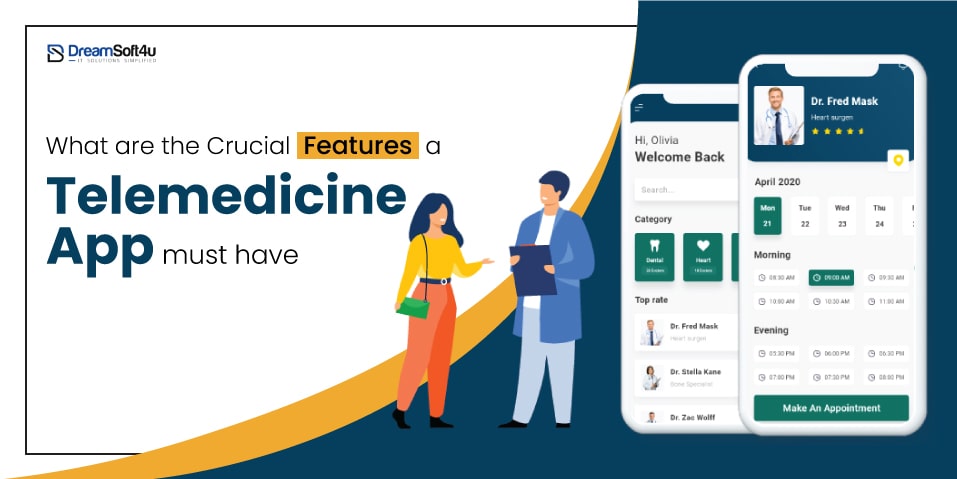Simply put SDLC or Software Development Life Cycle is a series of phases or stages that a team of developers follow to build a software product. Generally, it is considered that any SDLC has 7 key stages, but there can be more or less. It depends on the project scale and size too. But for this blog, we will primarily focus on the 7 stages of SDLC.
Table of Contents
ToggleWhat is the Software Development Life Cycle (SDLC)?
SDLC, or Software Development Life Cycle, is like a rulebook for software companies. It helps them enhance the development process and make better software. SDLC has seven main steps to create software or hardware.
Stages of SDLC: Check 7 Phases of the Software Development Life Cycle

- Planning
- Requirements
- Design and Prototyping
- Software Development
- Testing
- Software Deployment
- Operations and Maintenance
It is important to develop a plan of action to reduce delays and meet deadlines. To succeed in this competitive environment, businesses need to ideally develop their applications, using 5 effective software development methodologies, processes, and strategies.
An SDLC aims to allow the successful production of a high-quality solution that would meet or exceed the requirements of a customer at all its phases, within the provided budget and timelines. Whenever anyone starts developing a new product, it’s necessary to follow the stages of the software development life cycle, which we will cover below.
Benefits of Software development life cycle (SDLC)
SDLC is like a map for making software, showing everyone what to do, why, and how much it will cost software developers to understand what they should build and why. Both stakeholders decide upfront on the target and see a concrete plan to achieve the aim. Everybody knows the necessary costs and resources.
Here are some benefits of SDLC:
- Helps track progress and costs.
- Makes complex projects manageable.
- Detailed steps for better results.
- Checks for reliability and quality.
- Provides lots of documentation.
7 Stages of System Development Life Cycle (SDLC)
Now let’s discuss all 7 phases of the System development life cycle that every developer or software development company follows to develop the perfect software.

#Stage 1: Planning
Among the 7 steps of SDLC, the first one is the planning step. In this step, we are putting together all the tools to consider the scope and gravitas needed to pursue the software or project we want. The awareness of our customer’s requirements and how much capital, time, and resources we can contribute to their product’s success is also known as a “feasibility report.” When we are in the preparation process, the three things that are mandatory to keep in mind are:
- Identification of the system for development
- Feasibility assessment
- Creation of project plan
Furthermore, in this phase, we also we check if making the software or program is a good idea for investors and our business. We also see how well our company can handle it.
#Stage 2: Requirements
Next in the System development life cycle is the requirement. The team ensures the project requirements of the end-users of the system. The company needs to connect with IT departments to express the new technology and improvement criteria.
This step in the development process ensures that we gather all the necessary information and follow it to meet the client’s needs. Our developers, designers,, and product managers team up to document processes and workflows that we want to automate with software.
#Stage 3: Design and prototyping
After identifying and documenting the key requirements, the next stage involves creating a prototype. At the end of this phase, the team receives design documents that outline the chosen patterns and components for the project. More often than not, swift prototyping is part of the design process, allowing for a quick comparison of the most suitable solutions. This prototype serves as a starting point for further software development.
#Stage 4: Coding / Software Development
Once the software design is finished, the next step is coding. That’s when developers build the software using the chosen programming language. They split the work into smaller parts and gave each part to different developers.
Coding is a big part of the SDLC. During coding, developers follow set rules and use special tools like compilers and debuggers to create and run the code.
Stage#5: Testing
When the coding is complete, testing begins, and the modules are released for evaluation as software testing is necessary to avoid any bugs. The created software is extensively reviewed during this process, and any issues found are assigned to developers to repair them.
Retesting and regression testing are conducted until the software is as planned according to the expectations of consumers. Testers refer to the SRS document to make sure the software conforms to the customer’s standard.
#Stage 6: Software Deployment
In this phase, the goal is to deploy the software to the manufacturing environment so that consumers can start using the product. Many companies, however, prefer to push the product across different delivery environments such as a testing or staging area.
It enables every stakeholder to play with the product safely before it is introduced into the market. Therefore, this allows us to catch any final mistakes before launching the product.
#Stage 7: Maintenance
After finishing all the software development stages smoothly, the next crucial step is designing a maintenance plan. Without it, the software’s performance can suffer, as it won’t keep up with necessary updates and changes to meet evolving business requirements.
Why We Should Follow the Steps of the Software Development Life Cycle?
The stages of SDLC (Software Development Life Cycle) provide a clear picture of the whole system, the resources needed, the timeline, and the goals. This helps top management have better control with proper documentation.
It also helps software developers understand what to build and why. Both stakeholders decide on the project’s goals in advance and have a clear plan to reach them, including fair estimates of costs and resources.
Here are some benefits of SDLC are given below:
- It helps you track the system’s growth and costs easily.
- It improves control and monitoring of big or complex projects.
- Design reviews make sure the solution is reliable and high-quality.
- It offers thorough documentation, providing a framework for standard tasks
- New team members can seamlessly take over if someone leaves.
- It aids in evaluating, scheduling, and estimating deliveries.
- Ensures accurate and on-time project delivery.
Understanding SDLC Approach: Different Projects, Different Needs
Okay, you now understand SDLC, its key components, the different stages, and the benefits. But there is still one more thing- “The SDLC approach”.
You see, the ideal SDLC approach can vary depending on software project needs and goals. Maybe you want to build your software fast or maybe you need an MVP first. In either case, there isn’t a one-size-fits-all approach. The SDLC approach will vary. Commonly used SDLC approaches include:
- Waterfall
- Agile
- Rapid prototyping
- And Hybrid
The Waterfall Approach
This approach is more or less similar to the 7 stages we have already defined and discussed in detail. This is the traditional method, wherein the project has a linear progression. If you choose this approach, there has to be proper documentation and planning at every stage.
Ideally, this approach is followed for large complex software projects. If you have clear requirements, go for the waterfall approach. However, it is time and resource-consuming. Plus, offers limited flexibility. But it has its benefits too:
- Clear Roadmap (sequential, ideal for clear requirements )
- Reduced Risk (upfront planning)
- Detailed documentation (ideal for future maintenance and updates)
The Agile Approach
This approach has all the benefits that the traditional waterfall model lacks. It is flexible, iterative, and ideal for projects where requirements are not clear, but the vision is! That’s why most startups have an agile approach to their software development needs.
Here’s how the AGILE software development approach works:
“Develop in sprints, prioritize tasks, gather feedback fast, collaborate often.”
Agile, like waterfall, has both benefits and drawbacks:
- Adaptability (well suited for projects with evolving requirements)
- Faster Time to Market (short sprints & fast feedback )
- Better communication and ownership
But unlike waterfall, agile teams have to manage consistent backlogs. It can add to the project’s complexity. Plus, due to shorter sprints and fast feedback, detailed initial documentation is not always possible for agile development teams.
Rapid Prototyping (MVP)
If you don’t want to build a complete product, but rather a simplified functional version first; go for rapid prototyping. The prototypes are not feature-complete, but provide a basic framework for the final version. Usually, companies use to approach to explore their ideas, validate key features, reduce risks, and gather user feedback quickly.
There are limitations to this approach as well. First and foremost, MVPs are not finished products. Moreover, limited features mean that user testing is also limited to a certain extent.
The Hybrid Approach
Last, on our list, is the hybrid approach- a mix of all or some of the approaches mentioned above. At DreamSoft4U, we help businesses create a custom SDLC approach that best fits the project’s needs. Our approach can help you:
- Capitalize on the strengths of different methodologies
- Adjust your methodology as the project progresses
Conclusion:
The true value of SDLC becomes evident when put into practice. It speeds up development, and simplifies tasks, enabling you to meet your client’s needs on time and within budget. If you encounter challenges, don’t hesitate to reach out to an outsourcing software development company for expert guidance throughout the process
At DreamSoft4u, we believe SDLC is all about finding the right balance between your project needs, budget, and time. We carefully consider all factors to optimize your SLDC and ensure a successful project outcome.
FAQs
Q1: Are all prototypes or MVPs the same?
Not all software prototypes are the same. Some are low-fidelity, while others are high-fidelity. The former is a quick and not-so-polished model- basically to test ideas. High-fidelity prototypes are more polished, more functional, and more feature-ready. They are used to collect user feedback.
Q2: Can I combine Rapid Prototyping with Agile Development?
Yes, you can. They are like two best friends in an SDLC. With both processes combined, you will build prototypes fast, test them with users, and improve them continuously.
Q3: Can the SDLC approach be cloud-based?
Yes, SDLC can be cloud-based! It’s called the Cloud Development Life Cycle (CDLC). Think of it as the regular SDLC process but using cloud tools and resources for things like building, testing, and deploying software. This allows for:
- Faster development and deployment
- Easier scaling based on project needs
- Improved team collaboration (even remote!)
Q4: Software MVP for us and how long would it take?
Yes, we do create MVPs for startups and SMEs. However, the timeline can vary from one project to another. Let’s discuss your needs and we will share a cost estimate and timeline with you.
Q5: Do you have white-label solutions too?
Yes, we do have white-label software products for healthcare, logistics, entertainment, and other industry segments. These solutions are customizable too. You can explore these products on our website or simply visit our Contact Us page and book a free demo.


















